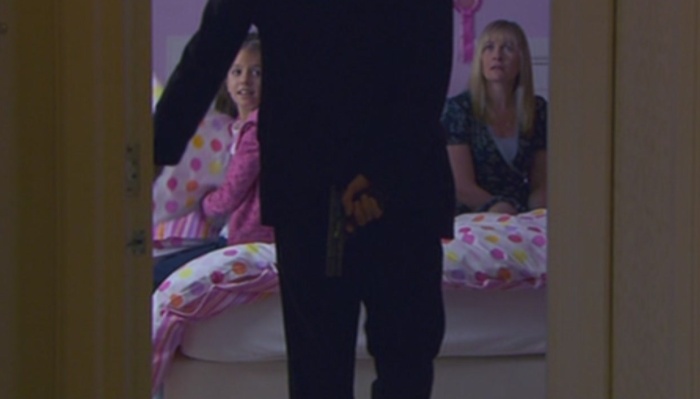(Originally written 5/1/14)
There are so many moments in this story which just go the extra mile to make their impact even more brutal. The death of Frobisher is the standout – I didn’t have to hear the gunshots to know what would happen, but the fact that I did makes it so much more real. And we always knew what the 456 were doing with the children would be bad, but using them to get high is the last straw. This is a fate which is completely unacceptable for the children of Earth.
Then there are the moments which have impact in hindsight. It’s tragic to watch Alice tell Johnson they need Jack, because we all know how Jack ends up solving the problem. On a lighter note, it’s cool to watch Bridget with the pollies, when Denise says she can’t imagine anyone wanting to be there, and there’s a close-up on Bridget’s face – a face which, we discover later, is recording everything through the contact lenses.
(So what exactly was Bridget’s relationship with Frobisher? I had thought she might be a former lover, especially when he kissed her on the cheek, but her talk with Lois implied that she hadn’t gotten as physically intimate as Lois apparently had. Maybe she always wanted to, or they both did? Whatever the case, it doesn’t make her any less awesome.)
But Bridget’s takedown of the PM isn’t quite as good a moment as I remembered it. Perhaps due the absence of Yates, Green is once again the most unlikeable character, in this case due to his sacrifice of Frobisher’s children. But while it’s good to see him get his comeuppance, Denise then steps in and implies that she’ll probably be taking his place as PM. This is the woman who last episode came up with the idea of how to remove the 10% – Green just went along with it. Am I supposed to feel comfortable with this woman taking over? I do find it interesting that the women in this miniseries are either fundamentally good – like Lois, like Bridget – or have shades of grey. Even Johnson is not pleased to find out what she’s been defending, and is genuinely upset when Steven is sacrificed. And while none of the men show enthusiasm for the 456’s plan, it is arguable that many of them show no emotion at all, instead focusing on how to deal with the situation.
(Though while the inoculation idea was a good cover story, it makes little sense to me why the government sent armed soldiers to collect the kids and they didn’t think this would look a bit suss. I suppose they wanted to make sure the kids didn’t resist, but the government’s plan to look like victims themselves wouldn’t really hold water after forcibly removing children from their schools and homes. Mind you, as soon as the children sent their final broadcast to kill the 456, the soldiers just stop, apparently completely aware that the enemy has been dealt with?)
Dekker is about the only one who carries on with a smile on his face, that same slimy smirk, apparently proud of himself for surviving for 456’s attack (which really shouldn’t have been possible). His most sickening moment is when he, rather than anyone else, suggests the use of Steven. Jack never wants to – it’s only when he’s pressured into it that he agrees.
So we’ve reached the end of Children of Earth, and what have we learnt? We’ve learnt that when faced with challenges, it’s important to fight for what you believe in – literally in the case of Johnny and his mates. You may have to step outside your comfort zone while doing so, like Andy (and Rhys, but especially Andy). You might not make it through to the other side, like Ianto and Frobisher. And you may find yourself doing things you never wanted to do, like Jack. But at the end of the day, forgiveness is important, because without that the world really would be ripped apart.
And Gwen taught us that working for Torchwood apparently makes the Pill ineffective, yet the employees are not warned about this.

No comments:
Post a Comment